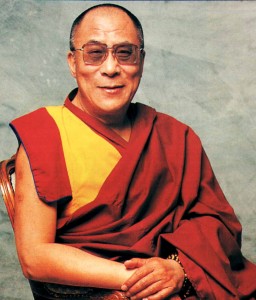Among world leaders, there is no one like His Holiness the Dalai Lama, religious and political leader of Tibet and winner of the 1989 Nobel Peace Prize. Brought up from an unusual childhood, he became head of the state of Tibet at age 16, and was later forced into exile by the Chinese government.
Despite all the hardship he had to endure he does not give up his fight for freedom and treats all sentiment beings with love and compassion.  Through his fight for freedom, he has proven himself to be the spiritual and political leader whom the people of Tibet love.
Through his fight for freedom, he has proven himself to be the spiritual and political leader whom the people of Tibet love.
Thought by many a living Buddha, a God king, The XIV Dalai Lama was born in Taskter in 1937. Dalai Lama means ocean of wisdom, though Tibetans normally refer to His Holiness as Kundun, the presence. In 1950, at the age of 16, His Holiness assumed full political power when China invaded Tibet. At this young age he was faced with many hardships such as the Chinese invading Tibet, shutting down monasteries and openly beating Monks and Nuns on the street. He wrote many letters to other countries such as America and Britain asking for support and recognition of Tibet as an individual country, but was many times responded with diplomatic letters and often direct rejection. He stood up to the authorities who were oppressing his people and at the young age that he was, held his ground and asserted his people against a country that is much stronger than his own. Many feared for his life but His Holiness said that he would stand by his people no matter what. In 1959, The Dalai Lama was forced into exile, but he did not end his fight for the liberation of his people. About 100,000 people followed him into exile and he established a democratically based alternative government at Dharamsala in Punjab, India, aptly known as little Lhasa. It has cultural and educational institutions and serves as a “capital-in-exile” for 140,000 Tibetan refugees. In the past decade, the Dalai Lama has tried to negotiate with the Chinese while in the main time pleads for help where ignored by United Nations and NATO who have gone to war to defend the Kawaties, the Bosnians and others. Despite the fact that they have forsaken the Tibetan people in favor of selling products to the Chinese masses the Dalai Lama is still fighting for the freedom of his people until this day. He is 63 years old and hopes to return to his country in his lifetime.
The works of The XIV Dalai Lama did not go unnoticed. In 1989 he received the Nobel Peace Prize for consistently championing policies of nonviolence and human rights in his own beleaguered country as well as in other strife-torn areas of the world. He is the first Nobel Laureate to be recognized for his concerns for global environmental problems. The Dalai Lama in his struggle for the liberation of Tibet consistently has opposed the use of violence. He has instead advocated peaceful solutions based upon tolerance and mutual respect in order to preserve the historical and cultural heritage of his people. His holiness, accepting the Nobel peace Prize, remarked: “The prize reaffirms our conviction that with truth, courage, and determination as our weapons, Tibet will be liberated. Our struggle must remain non violent and free of hatred.” Dalai Lamas are the manifestations of compassion, the Bodhisattva Chenrezig. They are enlightened beings who choose to take rebirth rather than pass into Nirvana, in order to help all sentiment beings and to serve humanity. They serve as spiritual and religious leaders to the people of Tibet who have practiced non-violence for over 1000 years. His Holiness describes himself as “A simple Buddhist monk, no more, no less.” People are touched by his simplicity and warmth. His constant message is the importance of love, compassion, and forgiveness. He held teachings and spoke of spiritual enlightenment, the purpose of life, Happiness and peace. No one has ever attended one of his teachings with out feeling changed by the experience. He speaks with confidence and preaches with compassion. He believes that qualities such as love, kindness, compassion and a sense of universal responsibility can be developed by everyone with or without religion. Despite the fact that His Holiness is worshiped by many as the reincarnation of a Buddha he holds a modest and humble attitude. “I myself am just a human being, and incidentally a Tibetan, who chooses to be a Buddhist monk” To the Dalai Lama he is here for a purpose and he has found that purpose- to serve his people and humanity.
The words and wisdom of His Holiness the Dalai Lama should be seriously considered. Whether or not he is the reincarnation of Buddha, he has proven himself to be a great leader to the Tibetan people, risking his own life for the sake of his people and their liberation. He deserves the recognition he got because he was an incredible leader both politically and spiritually during one of the hardest times in Tibetan history.
